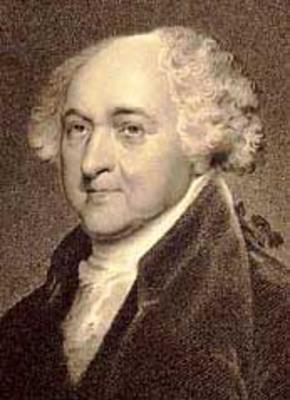I've been interested in history in all times.
Not until last week had I had the interview at a private school, the Lang. dept. Chair told me to be prepared that the school might want the Chinese teacher to teach one Chinese History class outside the regular language classes (IF, there aren't enough enrollment...). I remembered I used to think that if I didn't teach the language subject, I'd like to teach history instead.
History, i.e. his+story, apparently it's a genre about all kinds stories. Who wouldn't love stories? That's also the reason why I like watching movies, I guess, to see how the director tell a story.
Anyways, after Elizabeth I and II, almost all Jane Austen's adopted movies & TV series, I really enjoy watching HBO's John Adams for the past 2 weeks. It was only 5 years ago that I took the American History class during my 1st semester at SFSU. I could never remember the original 13 states at that time. However, after the 1st 2 episodes on HBO, those 13 states are easier to memorize now.
One interesting thing I observed in "John Adams" and it's also related to my profession is, when Johan Adams was assigned to gain the $$ and alliance with France in 1776, even as such a eloquent lawyer like John Adams himself failed to accomplish his mission due to the cultural difference and language barrier (Yeah... when the French king Louis XVI made fun of him:" No French? Not even one word?!" That really humiliated Adams).
Thank goodness, Adams' very political accurate wife Abigail asked him to bring their eldest son, John Quincy Adams (later he was elected as the 6th U.S. president in 1825 ), with him during this long trip. Little John Quincy went to school in Paris probably from ages 10~14, then at the age of 14, he travelled to St. Petersburg, Russia under his father's will to serve as translator and interpreter to the newly appointed American minster because the new U.S. diplomat needs a secretary who speaks French to help him survive in Queen Catherine's French-speaking court.
When I was watching this segment of the episode, I couldn't help but wondering what Mindy said in the comment about why most American are monolingual... So, we might see what things were like 230 years ago in the colonial America era. Sure, we can always debate that there might not be any resources for ordinary people to acquire a foreign language when they were struggling from day-to-day life. But, what about now?
Even now, most Americans still don't value the importance of acquiring foreign language(s). Of course the Bush Administration has stressed the need to have more Americans master “critical” languages, including Arabic, Chinese, Russian, Hindi and Farsi. Officials, noting that fewer than 2 percent of American students currently study any of the target languages, said that they are critical to national security and cultural understanding. However, from my previous interview experiences with one language school and 4 private schools in L.A. area, either none of the school directors have ideas of how the Chinese program will thrive (or we should say "survive" here, if they can't get enough students to enroll in the class, or drop out afterwards) or they don't know what to expect and achieve in this new Mandarin Chinese learning trend... There are still a lot of seeding and plowing to do in this newly developed ground.
Being able to speak French might not be the sole reason that John Quincy Adams later became the 6th U.S. president, but it was definitely the main reason why he was chosen to be the secretary at the age of 14. I believe that knowing a foreign language won't necessary bring you any immediate benefit, but surely will broaden your horizon of the world. And when the opportunity knocks on your door, you'll be more ready than others who don't posses this ability.



No comments:
Post a Comment